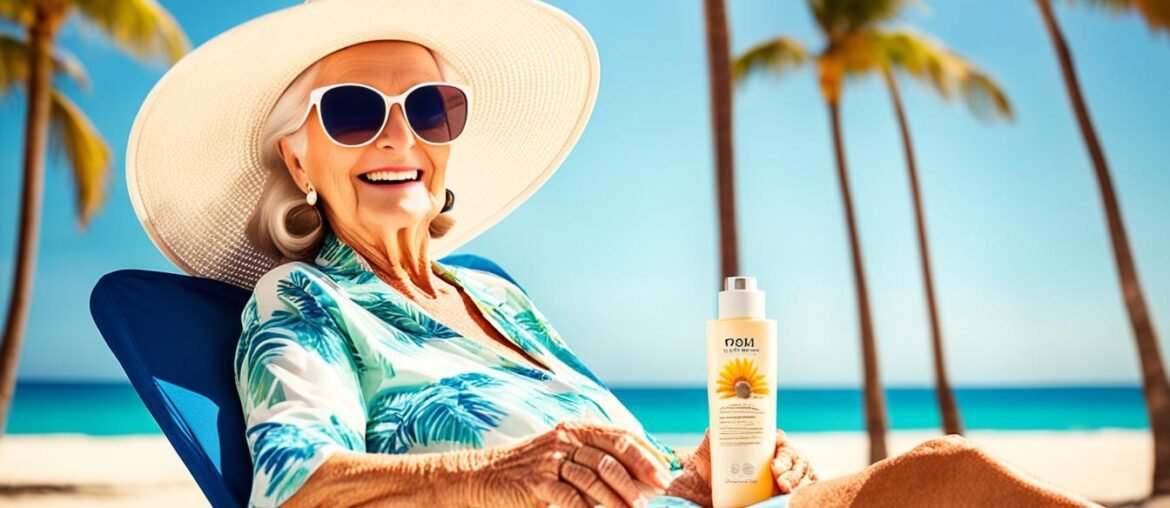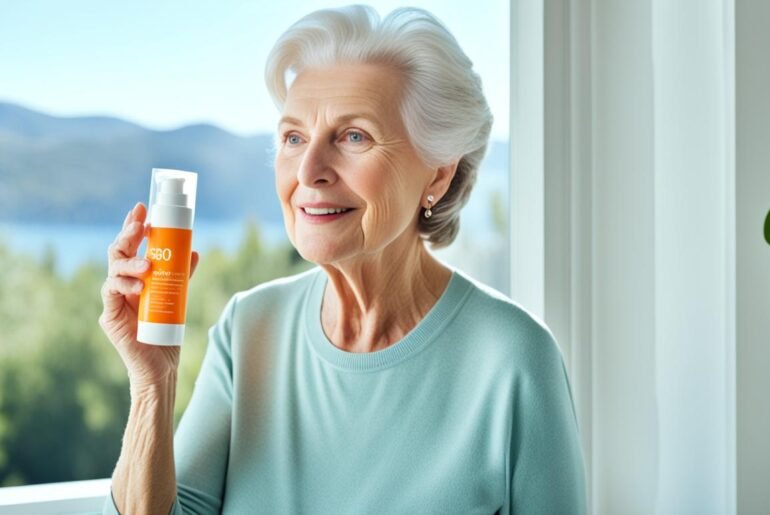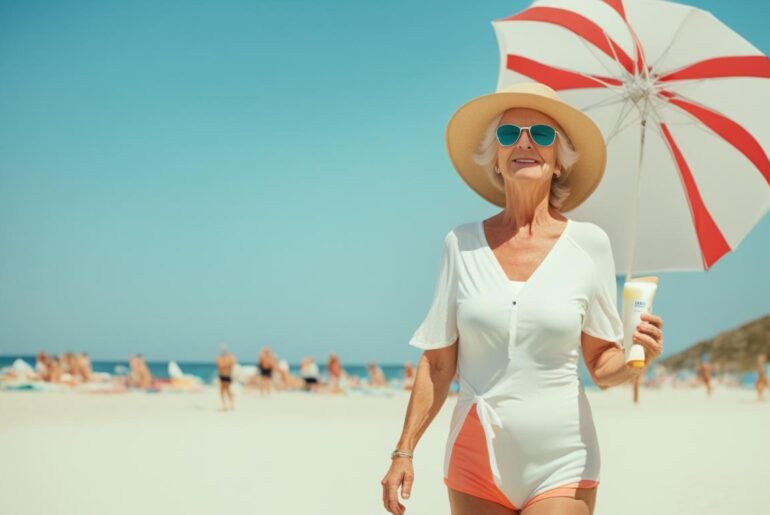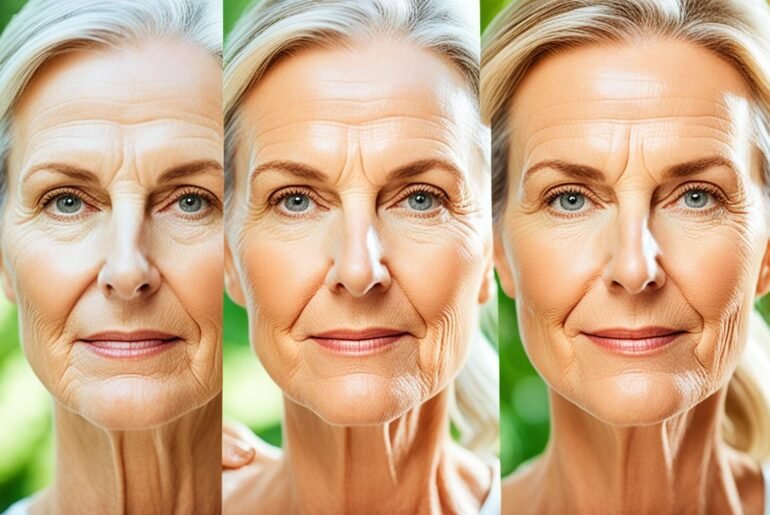Did you know that about 80% of the signs of aging we associate with age are actually due to sun exposure? That’s right, the sun’s ultraviolet (UV) rays are the main culprits behind skin changes and aging. So if you’re looking to maintain a youthful appearance as you age, sun protection should be at the top of your skincare priority list.
Key Takeaways:
- UV rays are the primary cause of skin aging.
- Regular use of sunscreen is essential in preventing UV damage to the skin.
- Protecting your skin from the sun can minimize the appearance of fine lines, sun spots, and decreased skin laxity.
- There are various sunscreen formulations available for mature skin.
- In addition to sunscreen, seeking shade, wearing protective clothing, and avoiding peak sun exposure hours are important tips for sun protection.
How UV Rays Damage the Skin
UV rays are a major factor in skin damage and can have detrimental effects on the skin’s health and appearance. It’s important to understand how these rays can harm our skin and the importance of sun protection in preventing damage.
UV Radiation
UV rays are a form of electromagnetic radiation emitted by the sun. They can be divided into two main categories – UVA and UVB rays.
UVA Rays
UVA rays can penetrate deep into the layers of the skin, reaching the dermis, which is the second layer. They contribute significantly to premature aging and wrinkles, as well as an increased risk of skin cancer.
UVB Rays
UVB rays primarily affect the top layer of the skin, known as the epidermis. They are the main cause of sunburns and play a major role in the development of skin cancer. UVB rays also contribute to the signs of aging, such as wrinkles and age spots.
Skin Damage and Actinic Keratosis
Prolonged exposure to both UVA and UVB rays can lead to damage to the skin cells. Over time, this damage can accumulate and result in conditions such as actinic keratosis. Actinic keratosis is characterized by rough, scaly patches on the skin and is considered a pre-cancerous condition.
Sun Protection
Protecting the skin from UV rays is crucial in preventing skin damage and reducing the risk of skin cancer. Sunscreen, protective clothing, and seeking shade can help minimize exposure to harmful UV rays. It’s important to choose a broad-spectrum sunscreen that provides protection against both UVA and UVB rays.
The Effects of Sunscreen on Aging Skin
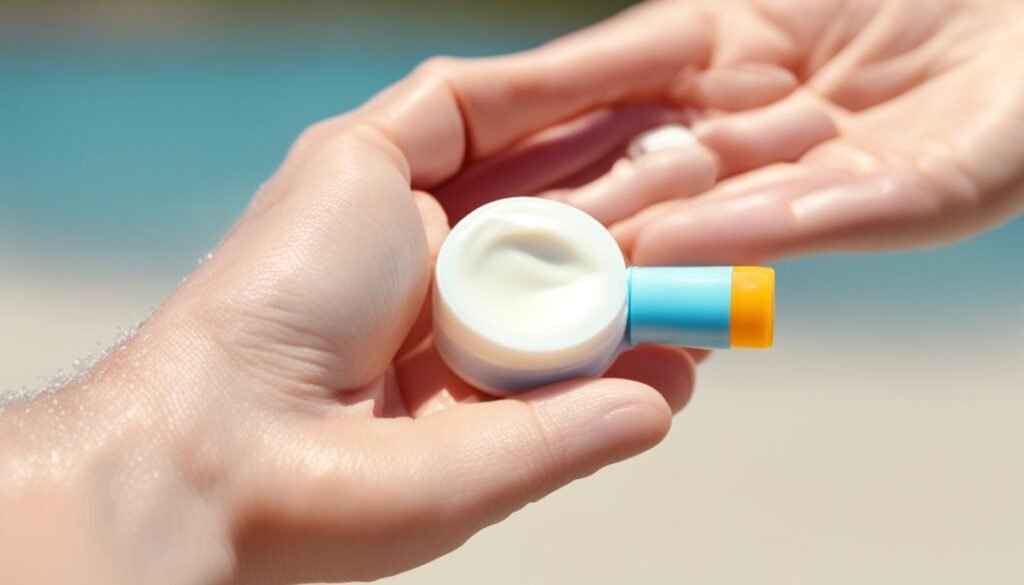
Regular use of sunscreen is not only effective in preventing sunburn and skin cancer, but it also plays a crucial role in slowing down the signs of aging. Sunscreen provides essential UV protection that can minimize the appearance of fine lines, sun spots, and decreased skin laxity, helping you maintain youthful-looking skin.
Exposure to UV radiation is one of the primary causes of premature aging. When your skin is exposed to the sun’s harmful rays, it can lead to the breakdown of collagen and elastin, two proteins responsible for maintaining the skin’s firmness and elasticity. Over time, this can result in the development of wrinkles, sagging skin, and uneven skin tone.
By incorporating sunscreen into your daily skincare routine, you can create a barrier between your skin and the sun, reducing the damage caused by UV rays. This helps to preserve the structural integrity of the skin and prevent the onset of premature aging signs.
Not all sunscreens are created equal when it comes to anti-aging benefits. Look for sunscreens that provide broad-spectrum protection, shielding your skin from both UVA and UVB rays. UVA rays penetrate deeply into the skin and contribute to the development of wrinkles and age spots, while UVB rays primarily cause sunburn. By choosing a sunscreen that offers protection against both types of rays, you can effectively combat the aging effects of the sun.
Additionally, opt for a sunscreen with a high SPF (Sun Protection Factor) to ensure optimal protection. The American Academy of Dermatology recommends using a sunscreen with an SPF of 30 or higher. This will shield your skin from approximately 97% of UVB rays.
When applying sunscreen, be sure to cover all exposed areas of your body, not just your face. This includes your neck, chest, hands, and any other body parts that are often exposed to the sun. Don’t forget to reapply every two hours or after swimming or sweating excessively, as sunscreen can wear off over time.
Benefits of Sunscreen for Aging Skin:
- Minimizes the appearance of fine lines and wrinkles
- Prevents the development of age spots and sunspots
- Maintains skin elasticity and firmness
- Reduces the risk of skin cancer
- Promotes overall skin health and a youthful complexion
By making sunscreen a regular part of your skincare routine, you can protect your skin from the damaging effects of the sun and maintain a youthful appearance for years to come.
Best Sunscreens for Mature Skin
When it comes to sun protection for mature skin, choosing the right sunscreen formulation is essential. Mature skin requires extra care and nourishment to maintain its health and youthful appearance. Here are some of the best sunscreens recommended by dermatologists:
| Sunscreen | SPF | Nourishing Ingredients |
|---|---|---|
| EltaMD UV Clear SPF 46 | SPF 46 | Niacinamide, Hyaluronic Acid |
| Supergoop Unseen Sunscreen SPF 40 | SPF 40 | Meadowfoam Seed Extract, Red Algae Extract |
| Isdin Eryfotona Actinica Sunscreen SPF 50+ | SPF 50+ | Photolyase Enzyme, Vitamin E |
| Neutrogena Ultra Sheer Moisturizing Face Serum SPF 60+ | SPF 60+ | Vitamin C, Hyaluronic Acid |
| La Roche-Posay Toleriane Double Repair Moisturizer SPF 30 | SPF 30 | Ceramides, Niacinamide |
These sunscreens not only provide effective sun protection with their high SPFs, but they also contain nourishing ingredients that benefit mature skin. Niacinamide and hyaluronic acid promote hydration and improve skin elasticity. Meadowfoam seed extract and red algae extract offer antioxidant benefits, protecting the skin from free radicals. Photolyase enzyme and vitamin E support DNA repair and minimize sun damage. Vitamin C and hyaluronic acid help brighten the complexion and maintain moisture levels. Ceramides and niacinamide strengthen the skin’s barrier function and soothe inflammation.
By choosing one of these top-rated sunscreens, you can ensure that your mature skin receives the sun protection it needs while also benefiting from the nourishing ingredients that promote overall skin health.
Other Tips for Sun Protection
While sunscreen is an essential part of sun protection, there are other measures you can take to protect your aging skin from sun damage. Incorporating these tips into your daily routine can help safeguard against the harmful effects of UV rays:
- Seek shade: When possible, seek shade to minimize direct sun exposure. This can be especially important during peak hours when the sun’s rays are strongest.
- Wear protective clothing: Opt for clothing that provides coverage and protection, such as long-sleeved shirts, pants, and wide-brimmed hats. Look for fabrics with a tight weave to block UV rays effectively.
- Use wide-brimmed hats and sunglasses: Hats with wide brims offer additional shade to your face and neck, while sunglasses protect your eyes from harmful UV rays.
- Avoid peak sun exposure hours: Try to schedule outdoor activities before 10 a.m. and after 4 p.m. when the sun is lower in the sky and UV rays are less intense.
Making these habits a part of your sun protection routine can help minimize the risk of sun damage and keep your skin looking youthful and healthy.
| Tip | Description |
|---|---|
| Seek Shade | Minimize direct sun exposure by seeking shade, particularly during peak hours when the sun’s rays are strongest. |
| Wear Protective Clothing | Opt for clothing that covers your skin, such as long-sleeved shirts, pants, and wide-brimmed hats with a tight weave to block UV rays effectively. |
| Use Wide-Brimmed Hats and Sunglasses | Wear wide-brimmed hats to provide additional shade to your face and neck and protect your eyes with sunglasses that block UV rays. |
| Avoid Peak Sun Exposure Hours | Schedule outdoor activities before 10 a.m. and after 4 p.m. when the sun is lower in the sky and UV rays are less intense. |
The Science of Skin Aging
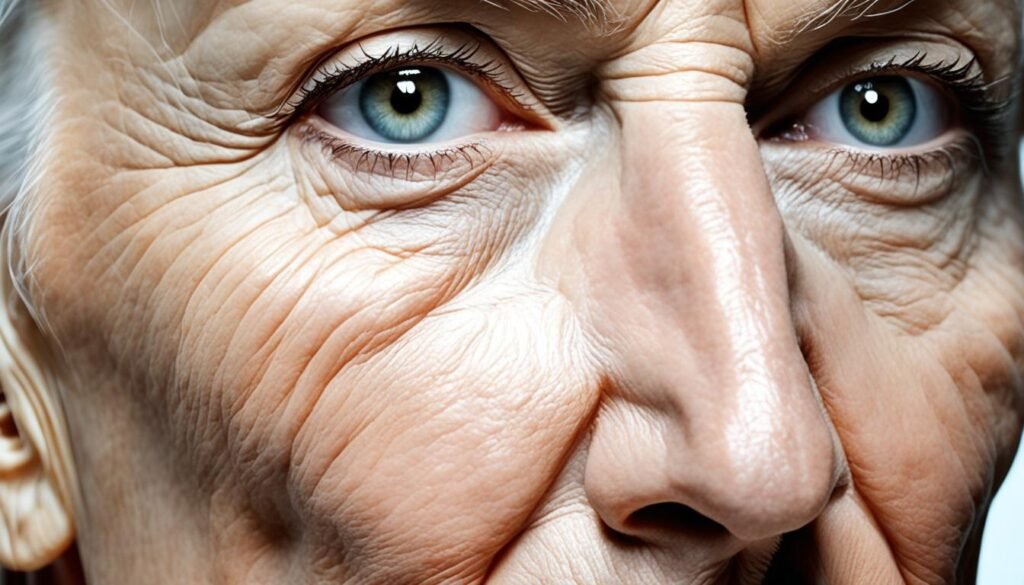
Skin aging is a complex process influenced by various factors that contribute to the visible changes in our skin over time. Understanding the science behind skin aging is crucial in developing effective skincare strategies that target the underlying causes and help maintain a youthful appearance.
One of the main contributors to skin aging is UV radiation from the sun. Prolonged sun exposure leads to the breakdown of collagen, which is responsible for the skin’s firmness and elasticity. This collagen degradation results in the formation of fine lines, wrinkles, and sagging skin.
Oxidative stress is another factor that accelerates skin aging. It occurs when there is an imbalance between the production of free radicals and the body’s ability to neutralize them. Free radicals are unstable molecules that cause damage to cells and accelerate the breakdown of collagen and elastin in the skin, leading to premature aging.
Biomarkers of aging, such as telomere length and DNA damage, also play a role in skin aging. Telomeres, the protective caps at the end of chromosomes, naturally shorten with age. This shortening is associated with cellular aging and can impact the skin’s ability to regenerate and maintain a youthful appearance. Additionally, DNA damage accumulated over time can impair the skin’s repair mechanisms and contribute to the aging process.
| Factors Influencing Skin Aging | Effects on the Skin |
|---|---|
| UV Radiation | Collagen breakdown, fine lines, wrinkles, sagging skin |
| Oxidative Stress | Collagen and elastin degradation, premature aging |
| Biomarkers of Aging | Telomere shortening, DNA damage, impaired skin regeneration |
To protect the skin from the damaging effects of UV radiation, it is crucial to incorporate sun protection measures into our daily routines. This includes wearing SPF sunscreen, seeking shade, and wearing protective clothing, hats, and sunglasses.
Additionally, antioxidant-rich skincare products can help neutralize free radicals and minimize oxidative stress in the skin. Ingredients like vitamin C, vitamin E, and green tea extract are known for their antioxidant properties and can aid in maintaining a youthful complexion.
By understanding the various factors that contribute to skin aging, we can make informed decisions about our skincare routines and adopt preventative measures to preserve the health and appearance of our skin.
Stay tuned for the next section, where I will discuss effective anti-aging strategies for the skin.
Anti-Aging Strategies for the Skin
When it comes to maintaining youthful and healthy skin, there are several strategies that can slow down the aging process. By combining the right anti-aging skincare products with a healthy lifestyle and a consistent skincare routine, you can rejuvenate your skin and enhance its overall health and appearance.
- Use Anti-Aging Skincare Products: Incorporating anti-aging skincare products into your routine can target specific concerns and promote skin rejuvenation. Look for products that contain ingredients known for their anti-aging properties, such as retinol, hyaluronic acid, vitamin C, and peptides. These ingredients can help reduce fine lines and wrinkles, improve skin texture, and enhance overall skin health.
- Adopt a Healthy Lifestyle: Lifestyle factors play a significant role in skin health and the aging process. To promote youthful-looking skin, prioritize a well-balanced diet rich in antioxidants and essential nutrients. Additionally, staying hydrated, getting regular exercise, and managing stress can contribute to overall skin health.
- Protect Your Skin from Sun Damage: Sun protection is crucial for preventing premature aging and maintaining healthy skin. Make sure to apply a broad-spectrum sunscreen with at least SPF 30 every day, even on cloudy days. Limit sun exposure and seek shade when the sun’s rays are at their strongest, typically between 10 am and 4 pm.
- Follow a Consistent Skincare Routine: Consistency is key when it comes to skincare. Establish a daily skincare routine that includes cleansing, toning, moisturizing, and applying sunscreen. A consistent routine ensures that your skin receives the necessary care and protection on a regular basis.
To illustrate the effectiveness of these strategies, here’s a comparison table of popular anti-aging skincare products:
| Product | Main Ingredients | Benefits | Price |
|---|---|---|---|
| Product A | Retinol, Hyaluronic Acid | Reduces wrinkles, boosts hydration | $50 |
| Product B | Vitamin C, Peptides | Brightens skin, improves elasticity | $35 |
| Product C | Niacinamide, Collagen | Minimizes pores, firms skin | $40 |
Ingredients in Anti-Aging Skincare
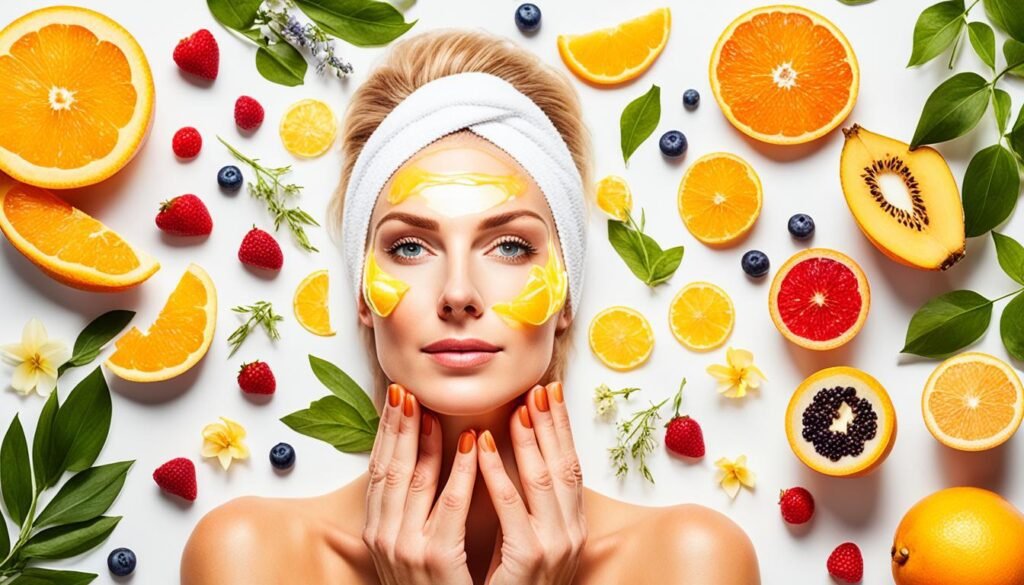
When it comes to anti-aging skincare, the right ingredients can make all the difference. These skincare products are formulated with powerful compounds that help address common signs of aging, such as fine lines, wrinkles, and loss of firmness. Let’s explore some key ingredients that have been proven to be effective in promoting youthful-looking skin.
Collagen Boosters
Collagen is a vital protein that gives skin its structure and elasticity. As we age, collagen production naturally declines, leading to sagging and the formation of wrinkles. Fortunately, certain ingredients can help boost collagen production, promoting firmer and more resilient skin. Two notable collagen boosters are:
- Retinol: This vitamin A derivative stimulates collagen synthesis, promoting smoother and plumper skin.
- Peptides: These small chains of amino acids signal the skin to produce more collagen, improving its overall structure and appearance.
Antioxidants
Antioxidants play a crucial role in combating oxidative stress caused by environmental factors like pollution and UV radiation. They help neutralize free radicals, which can damage collagen and elastin fibers, leading to premature signs of aging. Incorporating antioxidants into your skincare routine can help protect the skin from these harmful effects. Two powerful antioxidants to look for are:
- Vitamin C: This potent antioxidant brightens the skin, promotes collagen synthesis, and helps fade dark spots and hyperpigmentation.
- Vitamin E: Known for its moisturizing properties, vitamin E protects the skin from oxidative stress and helps maintain its natural barrier function.
Hyaluronic Acid
Hyaluronic acid is a molecule that naturally occurs in the skin and is known for its incredible hydrating properties. It has the ability to hold up to 1,000 times its weight in water, making it an excellent ingredient for replenishing moisture and enhancing skin plumpness. By incorporating hyaluronic acid into your skincare routine, you can enjoy a well-hydrated and smoother complexion.
These are just a few examples of the many anti-aging ingredients you can find in skincare products. Remember to choose products that suit your specific skin concerns and incorporate them into a consistent skincare routine for optimal results.
Non-Invasive Anti-Aging Treatments
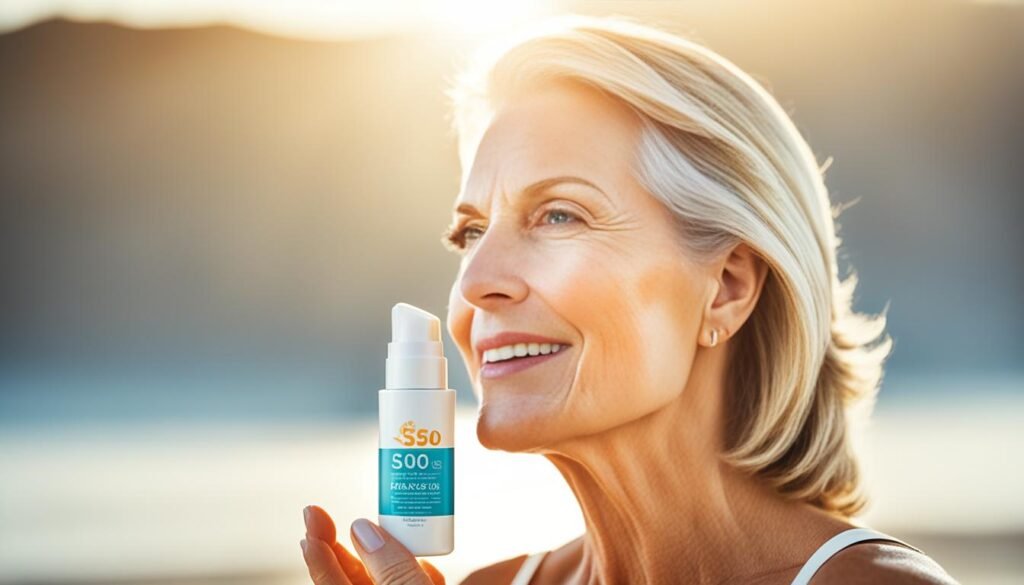
When it comes to combating the signs of aging, non-invasive treatments have gained significant popularity. These cosmetic procedures offer effective solutions without the need for surgery or invasive techniques. Two widely sought-after non-invasive treatments for skin rejuvenation are Botox and dermal fillers.
Botox, also known as botulinum toxin, is a purified protein that temporarily relaxes facial muscles, reducing the appearance of wrinkles and fine lines. It is commonly used to treat crow’s feet, forehead lines, and frown lines. The procedure requires minimal downtime, and results can last for several months, making it a go-to option for individuals looking for quick and noticeable improvements.
Dermal fillers are injectable substances that restore lost volume and plumpness to the skin. They can be used to fill in deep wrinkles, add definition to the lips, and enhance facial contours. Popular dermal filler options include hyaluronic acid-based fillers, such as Juvéderm® and Restylane®, which provide immediate results and can last for several months to a year.
One of the key advantages of non-invasive treatments is the ability to achieve noticeable results with minimal discomfort and downtime. These procedures are performed in-office by qualified professionals, ensuring safety and precision. Moreover, non-invasive treatments offer flexibility, allowing individuals to customize their rejuvenation goals by targeting specific areas of concern.
Although non-invasive treatments like Botox and dermal fillers provide immediate improvements, it is important to note that the effects are temporary. To maintain the desired results, periodic touch-up treatments may be necessary.
Benefits of Non-Invasive Anti-Aging Treatments:
- Immediate results
- Minimal discomfort and downtime
- Customizable treatments
- Performed by qualified professionals
- Safe and precise procedures
In summary, non-invasive treatments such as Botox and dermal fillers are popular choices for individuals seeking to reduce the appearance of wrinkles and restore volume to their skin. These cosmetic procedures offer immediate and noticeable results without the need for surgery, making them convenient options for skin rejuvenation.
Anti-Aging Skincare Innovations
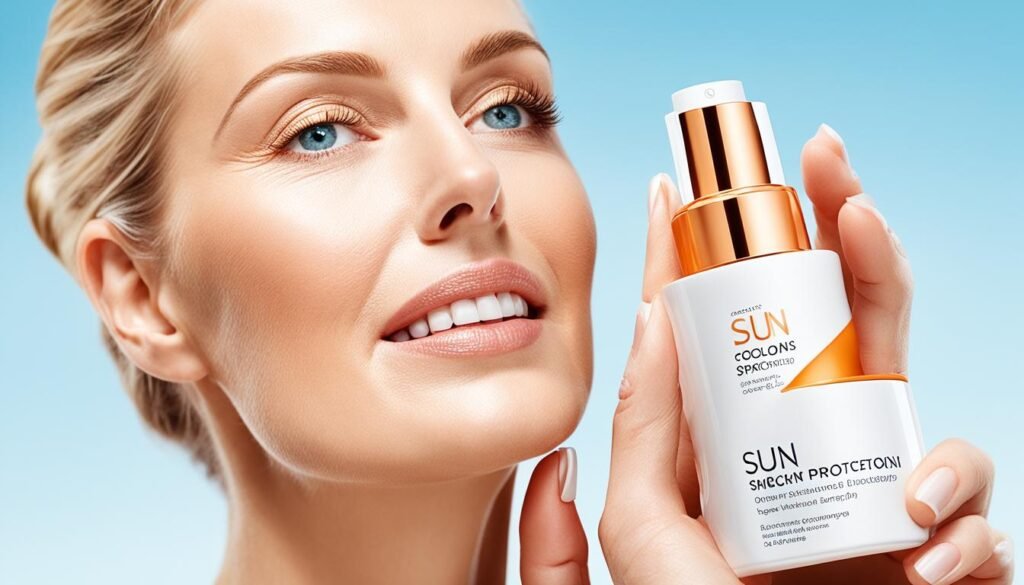
In the ever-evolving world of skincare, advancements in anti-aging technology continue to push the boundaries of what is possible. With a focus on harnessing the power of science, researchers and beauty experts are uncovering innovative approaches to combat skin aging. Let’s explore some of the latest breakthroughs in the field.
The Power of DNA Repair
“Our understanding of DNA repair mechanisms has revolutionized anti-aging skincare.”
Researchers have found that DNA repair is a key factor in maintaining youthful-looking skin. By targeting and repairing damaged DNA, scientists have developed skincare products that can help minimize the signs of aging. These products work to reverse the effects of environmental factors and promote healthier, more resilient skin.
Telomeres and Aging
- Telomeres: protective caps at the ends of chromosomes.
- Telomere shortening: a natural process that occurs with age.
Scientists have discovered that telomeres, the protective caps at the ends of our chromosomes, play a crucial role in the aging process. As we age, telomeres naturally shorten, leading to cellular aging. However, innovative skincare products now focus on telomere research, aiming to slow down telomere shortening and maintain youthful skin.
The Potential of Stem Cells
“Stem cells hold tremendous potential for anti-aging skincare.”
The use of stem cells in skincare is gaining traction as a promising avenue for combating aging. Stem cells have the unique ability to regenerate and repair damaged tissues, making them valuable in skincare formulations. By incorporating stem cell technology, skincare products can stimulate collagen production, improve skin texture, and reduce the appearance of wrinkles.
Stay Ahead of the Curve
Keeping abreast of these skincare advancements is essential for anyone looking to maintain youthful-looking skin. By embracing the power of DNA repair, understanding the role of telomeres, and exploring the potential of stem cells, you can leverage the latest innovations to achieve your anti-aging goals.
Remember, skincare is a journey, and staying informed about the latest advancements can empower you to make wise choices for your skin’s health and longevity.
Lifestyle Factors and Skin Aging

Lifestyle choices have a profound impact on the aging process of the skin. By making conscious decisions to prioritize skin health, we can effectively slow down the signs of aging and maintain a youthful appearance. Let’s explore some key lifestyle factors that play a crucial role in skin health:
Nutrition
A nutritious diet rich in antioxidants, vitamins, and minerals is essential for maintaining healthy skin. Consuming foods like fruits, vegetables, whole grains, lean proteins, and healthy fats provides the necessary nutrients for skin regeneration and collagen synthesis. These dietary choices help combat oxidative stress and inflammation, minimizing the appearance of wrinkles and promoting a vibrant complexion.
Sleep
Adequate sleep is vital for skin rejuvenation. During sleep, the body repairs and regenerates skin cells, allowing for a fresh and revitalized complexion. Lack of sleep can lead to increased levels of stress hormones, which contribute to collagen breakdown and the formation of wrinkles. Aim for 7-9 hours of quality sleep each night to support optimal skin health and prevent premature aging.
Stress Management
Elevated stress levels have a detrimental impact on skin health. Chronic stress triggers the release of cortisol, a hormone that can degrade collagen and impair the skin’s barrier function. Implementing stress management techniques, such as exercise, meditation, and deep breathing exercises, can help minimize the detrimental effects of stress on the skin. Taking time to relax and unwind is crucial for maintaining a youthful complexion.
Smoking and Alcohol Consumption
Smoking and excessive alcohol consumption accelerate the aging process and damage the skin. Smoking narrows blood vessels, reducing blood flow to the skin and depleting essential nutrients. It also releases harmful chemicals that break down collagen and elastin, leading to sagging and wrinkles. Similarly, excessive alcohol consumption dehydrates the skin and can contribute to premature aging. Quitting smoking and moderating alcohol intake are crucial for preserving skin health and preventing premature aging.
“Making healthy choices, such as maintaining a nutritious diet, getting enough sleep, managing stress, and avoiding smoking and excessive alcohol consumption, can contribute to better skin health.”
By incorporating these lifestyle choices into your daily routine, you can significantly improve the health and appearance of your skin. Making skin health a priority will not only enhance your overall well-being but will also contribute to a radiant and youthful complexion for years to come.
| Lifestyle Factors | Effects on Skin Aging |
|---|---|
| Nutrition | Provides essential nutrients for skin regeneration and collagen synthesis |
| Sleep | Allows for skin repair, regeneration, and a fresh complexion |
| Stress Management | Reduces the negative impact of stress hormones on collagen and skin barrier function |
| Smoking and Alcohol Consumption | Accelerates skin aging, degrades collagen, and impairs skin health |
Conclusion
Protecting the skin from sun damage is paramount in maintaining youthful-looking skin as we age. Incorporating sunscreen into a daily skincare routine, along with implementing other anti-aging strategies and adopting healthy lifestyle habits, can contribute significantly to preserving the health and appearance of aging skin.
Sunscreen is an essential component of any skincare routine, shielding the skin from harmful UV rays that are known to cause premature aging. By consistently applying sunscreen with adequate sun protection factor (SPF), individuals can prevent sunburn, reduce the risk of skin cancer, and lessen the appearance of fine lines, wrinkles, and sunspots.
In addition to using sunscreen, other anti-aging strategies such as wearing protective clothing, seeking shade during peak sun hours, and utilizing wide-brimmed hats and sunglasses can further safeguard the skin from sun damage. These precautions, combined with practicing good skincare habits like proper cleansing, moisturizing, and exfoliating, can help maintain the skin’s elasticity and overall health.
Furthermore, a holistic approach to anti-aging skincare involves adopting a healthy lifestyle. Nutritious eating habits, sufficient sleep, stress management, and avoiding smoking and excessive alcohol consumption all contribute to better skin health and slow down the aging process. By integrating these practices into a daily routine, individuals can enhance the effectiveness of their skincare regimen and promote a youthful complexion.
FAQ
What is the main cause of skin changes and aging?
The sun’s ultraviolet (UV) rays are the main cause of skin changes and aging. About 80% of the signs of aging we associate with age are due to sun exposure.
How do UV rays damage the skin?
UV rays can be categorized into UVA and UVB. UVA rays can penetrate deeper into the skin, while UVB rays primarily affect the top layer. Prolonged exposure to both types of UV rays can damage the skin cells and lead to conditions like actinic keratosis.
How does sunscreen help with aging skin?
Sunscreen is not only effective in preventing sunburn and skin cancer but is also crucial in slowing down the signs of aging. Regular use of sunscreen can minimize the appearance of fine lines, sun spots, and decreased skin laxity.
What are the best sunscreens for mature skin?
Some of the top recommendations from dermatologists include EltaMD UV Clear SPF 46, Supergoop Unseen Sunscreen SPF 40, Isdin Eryfotona Actinica Sunscreen SPF 50+, Neutrogena Ultra Sheer Moisturizing Face Serum SPF 60+, and La Roche-Posay Toleriane Double Repair Moisturizer SPF 30.
What are some other tips for sun protection?
Other tips for protecting aging skin from sun damage include seeking shade, wearing protective clothing, using wide-brimmed hats and sunglasses, and avoiding peak sun exposure hours.
What factors contribute to skin aging?
Skin aging is a complex process influenced by various factors, including UV radiation, collagen changes, oxidative stress, and biomarkers of aging.
What are some anti-aging strategies for the skin?
Some anti-aging strategies include using anti-aging skincare products, adopting a healthy lifestyle, protecting the skin from sun damage, and following a consistent skincare routine.
What ingredients should I look for in anti-aging skincare products?
Anti-aging skincare products often contain ingredients that help boost collagen production, such as retinol and peptides. Antioxidants like vitamin C and E protect the skin from oxidative stress, while hyaluronic acid helps to hydrate and plump the skin.
What are some non-invasive anti-aging treatments?
Non-invasive treatments like Botox and dermal fillers can help reduce the appearance of wrinkles and restore volume to the skin. These cosmetic procedures are popular for their ability to provide immediate results without the need for surgery.
What are some recent innovations in anti-aging skincare?
Recent innovations include DNA repair technology, telomere research, and the use of stem cells in skincare products.
How do lifestyle factors affect skin aging?
Lifestyle factors, such as maintaining a nutritious diet, getting enough sleep, managing stress, and avoiding smoking and excessive alcohol consumption, can play a significant role in the aging process of the skin.
Why is sun protection important for aging skin?
Protecting the skin from sun damage is crucial for maintaining youthful-looking skin as we age. Incorporating sunscreen into a daily skincare routine, along with other anti-aging strategies and healthy lifestyle habits, can help preserve the health and appearance of aging skin.

